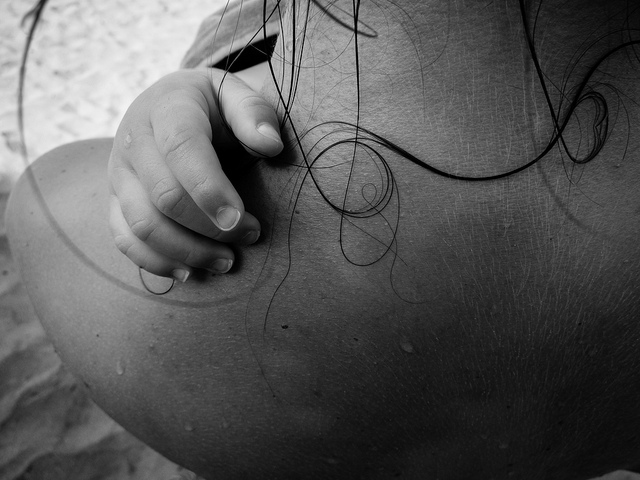I am not a mother—and I don’t plan to be—so this doesn’t affect me.
I have already had my babies, and I felt fine—this doesn’t concern me.
My friend seems fine. She will ask me if she needs help.
Everyone feels a little tired after having a baby. It will pass.
You just need a date night/manicure/time to yourself.
.
Sorry, women—but the above statements just don’t cut it.
I am self-admittedly a bit of a ‘birth junkie.” I am always inspired by the strength that, as women, we inherently hold. We are goddesses, healers and nurturers.
I am trained as a doula, a prenatal yoga teacher and a La Leche Leader, so I am often making connections with women before and shortly after their babies have entered the world—and I am always in awe. It is truly a magical time. There is a glow and a sweetness and a gentleness about it.
Well, until there isn’t…
As much time as I have spend around women in their childbearing years, I have never had a understanding of what postpartum depression is. Believe me—I thought I knew.
I thought I knew what baby blues are, and in contrast, what the warning signs of Postpartum depression (PPD) are. But I didn’t actually know or understand.
I didn’t know or understand it until I faced it myself.
Like many other issues relating to women’s health, PPD is often overlooked. We don’t talk about it much. It gets brushed under the table and talked about in hushed tones—the same way many other issues that primarily affect women do—like miscarriage, menopause and eating disorders.
However, as a circle of women, it is our job to inform ourselves of this very dark, scary and extremely common issue—one that our daughters, sisters, friends, doula clients and prenatal yoga students face (and fight!) daily.
Here are a few things we all need to know:
1. It’s common. Postpartum depression (PPD) affects 1/5 women. That is a lot, especially when you consider not all women even choose to have children. That means if you teach a prenatal yoga class, you are coming in contact with at least one women who will face it. That means that at least one of your new mom friends that you meet for coffee is quietly struggling. Maybe your grown daughter is suffering from it right now. The pretty, put-together mom at Whole Foods, wearing her baby in a sweet baby sling and filling her cart with organic baby goodies? She may have had a panic attack on the way to the store. Maybe you have no plans of having children, but many of your girlfriends have begun having babies—well, there is a pretty good chance one of them may be starting to develop PPD. And you wouldn’t even know it. Or—it could be you.
2. It can look different for everyone, and it is not always “feeling sad.” I used to think of PPD only as a feeling of sadness or weepiness, but it is not always. Postpartum depression can look different on anyone. Yes, it can be feeling sad, weepy and hopeless—but it can also present as anxiety and panic attacks, with persistent scary thoughts about something terrible happening to your baby. It can look like thoughts about you harming your baby or harming yourself or committing suicide. It can present as obsessive compulsive thoughts—checking and rechecking the lights, the stove, the baby monitor. It can be overwhelming fatigue. It can be all encompassing.
3. It’s shrouded in guilt and shame. Many moms will not ask for help. Although PPD affects 20 percent of mothers, many women will be scared and ashamed to reach out. They may worry about judgment and may even fear that their baby will be taken away. You can not assume that a mother will call you when she needs help, because of the stigmas that can surround her. Many women will feel guilty—even if, and especially if they have a healthy baby, a lovely birth experience and nothing particularly “wrong” on the surface. They may feel guilty and confused about having those scary, intrusive thoughts. And they will probably seem totally fine to you when you see them out for a walk, at coffee or at Mommy and Me Yoga class—yet, all the while they may be struggling to keep their heads above water.
4. You (yes, you!) can help. There are so many ways we can help a struggling mom. The first way is just by being open. If you have had PPD, say something! Normalize it. If a mom hears you have struggled in a similar way, she will begin to feel safe—and hopefully be able to ask for help, so that she can get the professional support she needs. If you have not ever had PPD, you can still normalize it by asking questions like, “How are you sleeping?” or “Have you been feeling like yourself? Is there any way I can support you? New motherhood can really take a toll!” Be open to whatever you hear, and let her know how common PPD is. If it seems like a mom does need help, offer to drive her to a therapy appointment. Let her know that this is not her, this is a mix of hormones raging, lack of sleep and a variety of physical and emotional changes that happened rapidly. Remove the stigma of medication. Compliment her on all the things she is doing right. Reassure her that she is an amazing mother and how brave she is for asking for help. Asking for help is the hardest part of the battle, and if she is courageous enough to ask for help, then you need to be there for her. Make sure she knows that PPD is nothing to be ashamed of—and that in fact, she is a warrior for facing it.
As women, we have a responsibility to carry each other. Like it or not, we are all in this together.
We put so much pressure on ourselves:
Be the perfect mom. Lose the baby weight immediately, and eliminate all signs that our bodies have ever carried children. Show no signs of aging. Have a flourishing career, but also spend every waking moment with your children. Oh, and you better use cloth diapers and make all your own baby food, too. Never admit you are struggling, sad, or anxious.
But, we aren’t perfect. All women struggle sometimes—mothers or not. Real lives don’t have Instagram filters. Real lives are messy, sweaty and sometimes weepy. They are poopy diapers, greasy hair and bags under your eyes. And sometimes, real life is the scary depths of postpartum depression. So whether you are a mama or not, think of those goddesses around you who could be suffering right now, and do your part to lift them up, and carry them through that darkness of PPD.
And maybe offer to carry their baby, too—baby cuddles are good for everybody’s soul.
.
Relephant:
The Quicksand Lies of Postpartum Depression.
.
Author: Logan Kinney
Editor: Yoli Ramazzina
Photo: Flickr/Andrés Nieto Porras
 Share on bsky
Share on bsky






Read 1 comment and reply